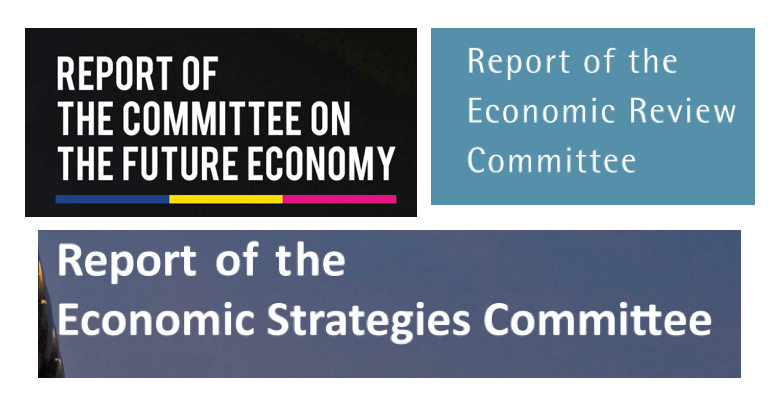With Finance Minister Heng Swee Keat set to deliver the Singapore Budget today (Feb. 20), let's look at some of the things that this year's Budget will have to address on Singapore's economy.
Every few years, the government forms an important committee to review and chart a new future direction for the Singapore economy.
The most recent incarnation of this committee, called the Committee on the Future Economy (CFE) released its report and recommendations on Feb. 9, making seven recommendations on how to keep our economy up-to-date and growing.
Here is an overview of CFE’s recommended economic strategies (read our coverage on them here):
1. Deepen and diversify our international connections
2. Acquire and utilise deep skills
3. Strengthen enterprise capabilities to innovate and scale up
4. Build strong digital capabilities
5. Develop a vibrant and connected city of opportunity
6. Develop and implement Industry Transformation Maps
7. Partner each other to enable growth and innovation
The regular review and recommendation of strategies of Singapore's economy has been done since 1986, when the Economic Committee (as it was called then) was formed to review the economic downturn that Singapore was going through at the time, and to make recommendations on how to reform and restructure Singapore’s economy for the future.
Here is a listing of the past strategies recommended by previous committees:
2010 – Economic Strategies Committee
- Growing through skills and innovation
- Anchor Singapore as a Global-Asia Hub
- Build a vibrant and diverse corporate ecosystem
- Make innovation pervasive, and strengthen commercialisation of R&D
- Become a smart energy economy
- Enhance land productivity to secure future growth
- Build a distinctive global city and an endearing home
2003 – Economic Review Committee
- Lowering costs, staying competitive
- Expanding external ties
- Maintaining our competitiveness and flexibility
- Encouraging entrepreneurship
- Promoting twin growth engines of manufacturing and services.
- Developing our people
1998 - Committee on Singapore’s Competitiveness
- Manufacturing and services as twin engines
- Strengthening the external wing
- Building world-class companies
- Strengthening our base of small & medium local enterprises
- Human and intellectual capital as a key competitive edge
- Leveraging on science, technology & innovation
- Optimising resource management
- Government as business facilitator
1991 - Economic Planning Committee
- Enhancing human resources
- Promoting national teamwork
- Becoming internationally oriented
- Creating a conducive climate for innovation
- Developing manufacturing and service clusters
- Spearheading economic redevelopment
- Maintaining international competitiveness
- Reducing vulnerability
1986 - Economic Committee
- Maintain a high savings rate
- Create a conducive business Environment
- Depend on the private sector
- Promote offshore activities
- Nurture both MNCs and local companies
Still with us?
Well, based on the latest recommendations by the CFE and past committees, there are some recurring strategies that will feature regularly among every committee's recommendations.
Let's take a look at them:
1. Singapore must always be internationally connected
 Source: Screen grab from CFE report
Source: Screen grab from CFE report
Every committee has made the recommendation for Singapore to develop its international connections, be it helping Singapore companies to expand overseas, through government investments in overseas markets, or by signing trade agreements and/or forming trade alliances:
2017 - Deepen and diversify our international connections.
2010 - Anchor Singapore as a Global-Asia Hub
2003 - Expanding external ties
1998 - Strengthening the external wing
1991 - Becoming internationally oriented
1986 - Promote offshore activities
2. The education and training of Singaporeans is critical to the economy
[caption id="" align="alignnone" width="2048"] Source: MOE Facebook[/caption]
Source: MOE Facebook[/caption]
It should not come as a surprise that the human capital is the only resource that Singapore possesses. Every committee has included education and training of Singaporeans to improve the skills of the economy's workforce through the relevant approaches of the times:
2017 - Acquire and utilise deep skills
2010 - Growing through Skills and Innovation
2003 - Developing our people
1998 - Human and Intellectual Capital As a Key Competitive Edge
1991 - Enhancing Human Resources
1986 - While not prominently featured among the broad strategies, education is listed as one of Singapore's "Fundamentals", and this was said of it: "Our population should be educated and trained to its fullest potential, since this is the only way to mobilize the talent available to the nation and apply it to productive use."
3. Helping businesses and building a good business environment
[caption id="" align="aligncenter" width="768"] Source: Your Singapore Facebook[/caption]
Source: Your Singapore Facebook[/caption]
Businesses are vital to any economy because they generate income and create jobs for Singaporeans. Hence, helping them in the best way possible, including encouraging entrepreneurship, is vital to Singapore's economy.
2017 - Strengthen enterprise capabilities to innovate and scale up
2010 - Build a vibrant and diverse corporate ecosystem
2003 - Encouraging entrepreneurship
1998 - Building world-class companies
1998 - Strengthening our base of small & medium local enterprises
1991 - Not prominently featured in the recommended strategy, but the report mentions this: "Develop a globalisation plan, whereby the Economic Development Board, along with other government agencies provides support for local companies to invest internationally and strengthen businesses in Singapore through business synergies."
1986 - Nurture both MNCs and local companies
Productivity and innovation are also featured in some form in every economic report. Regardless, whether or not they get mentioned in the final recommended strategy of each economic committee, the boosting of productivity and encouragement of innovation are drivers of various aspects of every report.
While the implementation of recurring strategies by the government may differ over the years, their recurrences show that there are some hard economic truths that we can't run away from, despite our attempts to restructure our economy.
With that in mind, let's see how the Budget will address these aspects of our economy, when Heng delivers the Budget in Parliament today.
Top image from here, here, and here.
If you like what you read, follow us on Facebook and Twitter to get the latest updates.
If you like what you read, follow us on Facebook, Instagram, Twitter and Telegram to get the latest updates.
